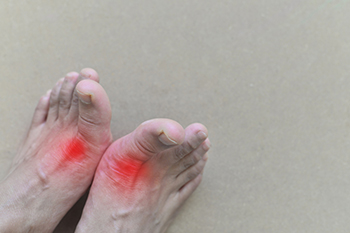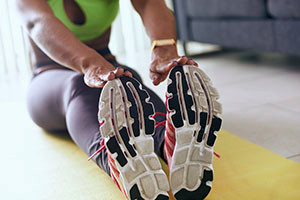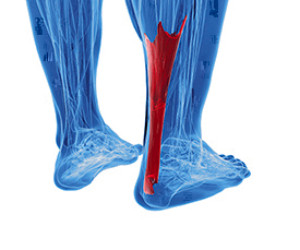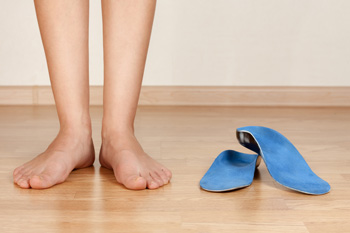Connect With Us
Blog
Items filtered by date: July 2023
Specific Foods Can Be Linked to Gout Attacks

Gout is defined as a foot condition that can cause severe pain and discomfort. It often targets the joints in the big toe and is caused by an excess level of uric acid. Eating foods that have high levels of purines may cause uric acid levels to rise and convert to crystals that lodge in the joints of the toes. There are trigger foods that can be avoided in patients who have gout, and this may reduce the number of painful gout attacks. Red meat can fall into this category, and frequently eating this food can increase the chances of getting gout. Many people think honey is an alternative to processed sugar, however, it also contains a large amount of uric acid. There are certain types of seafood that have high levels of purines. These can consist of shellfish, sardines, anchovies, and scallops, and gout patients are advised to eat infrequent or small amounts of these types of seafood. If you would like more information about what type of foods can trigger gout attacks, it is suggested that you confer with a podiatrist who can provide you with healthy food choices to choose from.
Gout is a painful condition that can be treated. If you are seeking treatment, contact one of our podiatrists from Crosstown Podiatry. Our doctors will treat your foot and ankle needs.
What Is Gout?
Gout is a form of arthritis that is characterized by sudden, severe attacks of pain, redness, and tenderness in the joints. The condition usually affects the joint at the base of the big toe. A gout attack can occur at any random time, such as the middle of the night while you are asleep.
Symptoms
- Intense Joint Pain - Usually around the large joint of your big toe, and it most severe within the first four to twelve hours
- Lingering Discomfort - Joint discomfort may last from a few days to a few weeks
- Inflammation and Redness -Affected joints may become swollen, tender, warm and red
- Limited Range of Motion - May experience a decrease in joint mobility
Risk Factors
- Genetics - If family members have gout, you’re more likely to have it
- Medications - Diuretic medications can raise uric acid levels
- Gender/Age - Gout is more common in men until the age of 60. It is believed that estrogen protects women until that point
- Diet - Eating red meat and shellfish increases your risk
- Alcohol - Having more than two alcoholic drinks per day increases your risk
- Obesity - Obese people are at a higher risk for gout
Prior to visiting your podiatrist to receive treatment for gout, there are a few things you should do beforehand. If you have gout you should write down your symptoms--including when they started and how often you experience them, important medical information you may have, and any questions you may have. Writing down these three things will help your podiatrist in assessing your specific situation so that he or she may provide the best route of treatment for you.
If you have any questions, please feel free to contact our offices located in Wayne, Montclair, and Randolph, NJ . We offer the newest diagnostic and treatment technologies for all your foot care needs.
Preventing Running Injuries Is Crucial

Having an injury can cause runners to become upset, realizing they may have to stop running or jogging so their body can heal properly. This may be avoided when correct running prevention techniques are implemented. It is beneficial to take the necessary time to perform a warm up and cool down before and after any running activity, which may be successful in protecting the feet. Additionally, running injuries may be avoided when mileage and distance are increased gradually, and it may help to use proper form while running. Incorporating strength training exercises is a good method in keeping the muscles and bones strong, and there are multiple ways this can be accomplished. The soles of the feet can become stronger when they are rolled on a foam roller or frozen water bottle. This may be helpful in breaking up existing scar tissue, and generally loosening the feet up before embarking on a running routine. If you would like more information about how to protect the feet and prevent running injuries, it is suggested that you confer with a podiatrist.
Exercising your feet regularly with the proper foot wear is a great way to prevent injuries. If you have any concerns about your feet, contact one of our podiatrists of Crosstown Podiatry. Our doctors will treat your foot and ankle needs.
How to Prevent Running Injuries
Many common running injuries are caused by overuse and overtraining. When the back of the kneecap starts wearing out and starts causing pain in your knee, this is commonly referred to as runner’s knee. Runner’s knee is a decrease in strength in your quadriceps and can occur if you’re not wearing properly fitted or supporting shoes. To prevent runner’s knee, focusing on hip strengthening is a good idea, as well as strengthening your quads to keep the kneecaps aligned.
What Are Some Causes of Running Injuries?
- One cause of a common running injury is called iliotibial band syndrome.
- Plantar fasciitis is also another common injury.
- Stress fractures can occur from overtraining, lack of calcium, or even your running style.
Best Ways to Prevent Running Injuries
- Wear footwear that fits properly and suits your running needs.
- Running shoes are the only protective gear that runners have to safeguard them from injury.
- Make a training schedule. Adding strengthening exercises as well as regular stretching can help keep you strong and limber and can lessen the possibility of injuries.
- Stretching keeps muscles limber; this will help you gain better flexibility.
If you have any questions please feel free to contact our offices located in Wayne, Montclair, and Randolph, NJ . We offer the newest diagnostic and treatment technologies for all your foot and ankle needs.
The Function of the Achilles Tendon

The Achilles tendon is located in the back of the lower leg and connects the heel to the calf muscles. An injury can cause this tendon to become torn or inflamed, which often produces severe pain and discomfort. People who increase speed and distance too quickly while running may be prone to incurring an Achilles tendon injury, and this and similar activities will have to temporarily stop as the tendon heals. The Achilles tendon is responsible for pointing and flexing the foot and is instrumental while walking and running. Treatment generally begins with resting the affected foot, and it may help to take over the counter pain medications for mild relief. Many people will seek medical care for this type of injury, which can start by having a diagnosis performed. This can consist of having an X-ray done, which can determine if there is a bone injury. Once the Achilles tendon has healed, mild stretches can be performed, which may help to restore strength to the leg. If you have experienced this type of injury, it is strongly suggested that you confer with a podiatrist who can help you to manage this condition.
Achilles tendon injuries need immediate attention to avoid future complications. If you have any concerns, contact one of our podiatrists of Crosstown Podiatry. Our doctors can provide the care you need to keep you pain-free and on your feet.
What Is the Achilles Tendon?
The Achilles tendon is a tendon that connects the lower leg muscles and calf to the heel of the foot. It is the strongest tendon in the human body and is essential for making movement possible. Because this tendon is such an integral part of the body, any injuries to it can create immense difficulties and should immediately be presented to a doctor.
What Are the Symptoms of an Achilles Tendon Injury?
There are various types of injuries that can affect the Achilles tendon. The two most common injuries are Achilles tendinitis and ruptures of the tendon.
Achilles Tendinitis Symptoms
- Inflammation
- Dull to severe pain
- Increased blood flow to the tendon
- Thickening of the tendon
Rupture Symptoms
- Extreme pain and swelling in the foot
- Total immobility
Treatment and Prevention
Achilles tendon injuries are diagnosed by a thorough physical evaluation, which can include an MRI. Treatment involves rest, physical therapy, and in some cases, surgery. However, various preventative measures can be taken to avoid these injuries, such as:
- Thorough stretching of the tendon before and after exercise
- Strengthening exercises like calf raises, squats, leg curls, leg extensions, leg raises, lunges, and leg presses
If you have any questions please feel free to contact our offices located in Wayne, Montclair, and Randolph, NJ . We offer the newest diagnostic tools and technology to treat your foot and ankle needs.
It's Time for Beautiful Feet
What Type of Orthotic Do I Need?

Orthotics are inserts that are placed inside the shoe. They can be purchased in a store or can be custom-made to correct a specific foot condition. These can include bunions, hammertoe, plantar fasciitis, or neuromas, and choosing the right type of orthotic may help to reduce existing pain and discomfort. People who have flat feet or other foot abnormalities may benefit from wearing orthotics. An over-the-counter orthotic is generally chosen based on what the foot condition and shoe size is, whereas kiosk orthotics are chosen by having a foot scan performed. When orthotics are custom-made, an evaluation of activity level, medical conditions, height and weight is done to determine what type of materials the orthotics will be made from. If you have a foot abnormality and are interested in learning about different kinds of orthotics, it is strongly suggested that you speak with a podiatrist who can determine which type is best for you.
If you are having discomfort in your feet and would like to try orthotics, contact one of our podiatrists from Crosstown Podiatry. Our doctors can provide the care you need to keep you pain-free and on your feet.
What Are Orthotics?
Orthotics are inserts you can place into your shoes to help with a variety of foot problems such as flat feet or foot pain. Orthotics provide relief and comfort for minor foot and heel pain but can’t correct serious biomechanical problems in your feet.
Over-the-Counter Inserts
Orthotics come in a wide variety of over-the-counter inserts that are used to treat foot pain, heel pain, and minor problems. For example, arch supports can be inserted into your shoes to help correct overarched or flat feet, while gel insoles are often used because they provide comfort and relief from foot and heel pain by alleviating pressure.
Prescription Orthotics
If over-the-counter inserts don’t work for you or if you have a more severe foot concern, it is possible to have your podiatrist prescribe custom orthotics. These high-quality inserts are designed to treat problems such as abnormal motion, plantar fasciitis, and severe forms of heel pain. They can even be used to help patients suffering from diabetes by treating foot ulcers and painful calluses and are usually molded to your feet individually, which allows them to provide full support and comfort.
If you are experiencing minor to severe foot or heel pain, it’s recommended to speak with your podiatrist about the possibilities of using orthotics. A podiatrist can determine which type of orthotic is right for you and allow you to take the first steps towards being pain-free.
If you have any questions please contact our offices located in Wayne, Montclair, and Randolph, NJ . We offer the newest diagnostic and treatment technologies for all your foot and ankle needs.

